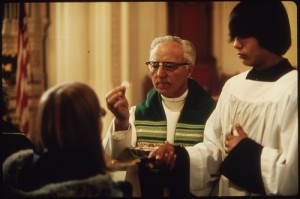This is a warning from a pastor to the church: THERE ARE PEOPLE IN THE CHURCH TO AVOID.
You may think that this contradicts the second most important command to love your neighbor as yourself. But it doesn’t. Sometimes service to others demands that we avoid certain people. In Romans 16:17, Paul writes, “I appeal to you brothers, to watch out for those who cause divisions and create obstacles contrary to the doctrine that you have been taught; avoid them.”
Paul pleads with his readers to do two things: 1) watch out and 2) avoid. Watching out means keeping your eye on someone. Avoiding means “bending away from,” or to “fully avoid by deliberate, decisive action.” There are people in the church that you must identify and move away from.
Watching Out and Avoiding People – Isn’t That Judgmental?
Now you might be thinking, “Isn’t this being judgmental?” No – we are judgmental when we look down on someone as though we are morally superior to them. This appeal is for something different, something more like discernment. We must be able to identify dangerous people within the church without slipping into judgmental-ism. God’s command to love does not mean that we embrace or ignore divisive Christians in the name of humility.
Avoiding doesn’t mean shunning or being cold or cruel. It’s deliberately keeping your distance and purposely refusing to move toward certain people. Avoiding divisive people means not being their best friend, not trusting your heart in their hands, not encouraging them into church leadership, not opening your home to them, etc. It is distancing yourself from them, moving away from association with them.
Avoiding is also not hiding. For example, if you see a divisive person in the grocery store, don’t duck behind an aisle. What will you do when they come around the corner and spot you? Act like you were inspecting an item on the lower shelf? Pretend that you didn’t know they were in the store? This is just cowardly deception. Avoidance is more valiant than this – it’s clear-thinking commitment to watch out for and steer clear of dangerous people within the church.
How to Identify Divisive People
So, we know there is such thing as divisive people, and we know we’re supposed to watch out and avoid them – but how can we tell who these people are? In verse 18, we see they are “persons [who] do not serve our Lord Christ, but their own appetites, and by smooth talk and flattery they deceive the hearts of the naive.”
Before we go further, you need to know that this is no excuse to avoid merely difficult people. Of course there are people you would like to deliberately and decisively avoid just because they get on your nerves or intimidate you. This watching out and avoidance is in reference to a specific breed of church folks. They’re not just difficult – they’re dangerous.
Also, before examining the character of these divisive people, remember that this is not a witch hunt. Don’t comb your church directory labeling people with a big red “D” based on these observations. This is about discernment. Meditate on this passage so that it becomes part of the way you think about the church and the people around you, and so that you can be wise in your dealings with others, watching out for the following characteristics:
Divisive People Are Divisive (*shocker*)
The first and obvious characteristic of divisive people is their divisiveness. This means that they often cause people to stand apart from one another. Where there are interpersonal problems within the church, these people are often at the roots.
Remember that divisions require at least two or more people and not everyone involved in a division is a divisive person. But if, over the years, a common denominator emerges in many such problems, he or she is likely a divisive person who needs to be avoided. We’re talking here about “the usual suspects” involved in church disputes.

Divisive People Create Doctrinal Obstacles
Honest questions about established doctrines are good. But people who constantly question such doctrines without ever moving beyond them may be divisive. When Paul says, “[W]atch out for those who … create obstacles contrary to the doctrine that you have been taught,” he is referring to those who regularly derail the Christians beside them with doctrinal traps and puzzles. These are the people that teachers hate to see walk in to the classroom. These people love to show their knowledge and creativity with Scripture, but not to encourage others to move forward as Christians. They seem to have more insight into scripture than fruitfulness in their lives.
The fact is, these people “do not serve our Lord Christ, but their own appetites.” They’re involved enough in church life to cause division, and mentally engaged enough to trip everyone else up because they don’t really care about Jesus – they care about satisfying their own desires. They’re hungry, but not for righteousness.
Divisive People Have Manipulative Speech
Divisive people are often characterized by smooth talk and flattery. Why is ice cream so dangerous? Because it goes down smooth! The things divisive people say will taste great, but will have disastrous after-effects.
It isn’t usually the brutish and abrasive who are truly dangerous in the church. They are obviously messed up. It’s the smooth-talking flatterers who sound good and make you feel good about yourself. You’ll want to listen to them and hear their ideas. But you’ve got to watch out for those whose words are smoother than their lives, those who can speak well of you to your face and ill of you behind your back. They don’t care about the truth so much as the effect they can produce in you with their words. They are manipulative.
The Danger of Divisive People
Why is this so dangerous? Because it will destroy the naive and ruin lives. Note that Paul says divisive people “deceive the hearts of the naive.” They don’t just deceive the naive – they deceive their hearts. This is the innermost part, the very identity. Divisive people do not only corrupt vulnerable Christians, they reprogram their hearts to falseness.
This was Satan’s approach in Eden. Way back when, he slithered up to naive Eve in the form of a serpent. Now he slithers up to naive Christians in the form of divisive church people. Make no mistake: divisiveness, doctrinal obstacles, manipulative speech – these things are evil. After all, that’s what Paul calls them in verse 19:
For your obedience is known to all, so that I rejoice over you, but I want you to be wise as to what is good and innocent as to what is evil.
We must bend away from such people because they are in league with Satan himself and will destroy the unsuspecting in our church.
We’re All Guilty of Being Divisive
Now, before we hike up too high on our horse at all this, let’s think plainly about our own sins here. I suspect that many (if not all) of us have been involved in some of these things. At one point, we’ve all probably made a show of our biblical knowledge and creativity – not to serve Jesus, but our own appetites for attention. We’ve spoken untrue praise to someone’s face to avoid social awkwardness. And I’m sure we’ve all gossiped, exaggerated or complained about someone to others, setting our listeners against them.
We must beware that these things are no mere trifles. They are the subtle evils of Satan slithering into our lives and church. We must avoid those who are pros at these things and we must pursue unity, doctrinal helpfulness and honest speech.
The Promise
Now, at the end of all this in verse 20, there is a promise to us:
The God of peace will soon crush Satan under your feet. The grace of our Lord Jesus Christ be with you.
In all these things we must never despair. God will soon crush Satan – the one ultimately behind church divisiveness – under our feet. Therefore, we have much to rejoice in and every reason for confidence as we move forward together as a church.
Discussion Starters
- How can you “watch out for those who cause divisions and create obstacles” without being paranoid or judgmental?
- Without naming names, do you feel that we have any such people involved in Dulin’s Grove?
- What are some practical ways we can avoid such people? What if they are family members, even spouses?
- Looking at the passage as a whole, what “appetites” might divisive people be serving?
- What is the difference between smooth talk/flattery and just trying to be kind with our words?
- Why does Paul include the promise of verse 19 in this passage? What does this have to do with the rest of the paragraph?
- If you suspect that you are a divisive person, what should you do? What steps can a divisive person take to respond to this passage?
- This passage is written to the church at large. Do church leaders have a different responsibility toward divisive people than the laity? What other scriptures can shed light on this question?
- Take some time to pray for our church.








It is amazing how the scripture can be easily twisted when a question is being asked of a pastor with book chapter and verse and they feel threatened because I challenge them in love but they tell other church members that I am divisive because of a concern of what I though was being Christ-like. I they began to see that they like conformity rather than unity. How can you call an honest truthful person divisive if they come directly to that person. I think they are afraid to be called out so they get the jump on a person… Read more »
I went through something really painful/awful over a decade ago. It involved a cliquey little group from a church led by a pastor who was also as divisive. This group came to my home each month for a Bible study. They were very entrenched in the prophetic movement. It was during a time when the Lord was very actively moving in my life, so I was interested in learning about prophetic gifting, etc. Turned out they were speaking a lot of lies, talking ill about me behind my back, and set the pastor and his wife (and several others) against… Read more »
Had a run in with such a person in a church. My wife attempted to distance herself from them and she confronted my wife 3 minutes before service, in front of the whole church. To make a long story short, our pastor contacted us to meet with my wife and the other party in an attempt to reconcile. Turned out the pastor took the decisive ones side and just blew anything my wife had to say. Needless to say after an hour long meeting that was going nowhere, we no longer attend church.
Hi I found this article very interesting. We are a small church but 3 months ago we started to get a lot of strife in the church we had 3 new people. Our pastor starting to change things to suit these people but now I feel our pastor is getting ganged up on as a deacon in the church I’m praying against these divisions asking gods direction please pray for our church.
Janet, I’m sorry to hear your church is experiencing turmoil. I pray that God will make you "wise as to what is good and innocent as to what is evil" (Romans 12:19) as you do your part to pursue unity. In Christ, Matt
I FOUND THE MATERIAL VERY USEFUL; I WILL USE IT FOR CURRENT ISSUES NOW HAPPENING IN A LOCAL CHURCH. THANK YOU SO MUCH.
Thank you Virgilio. I pray the Lord will give you great spiritual wisdom for shepherding your church through the issues you’re facing.
They said to you, In the last time there will be scoffers, following their own ungodly passions. It is these who cause divisions, worldly people, devoid of the Spirit.
I was encouraged by reading your article (DIVISIVE PEOPLE). i am a pastor of a church in in Malta and have just experienced a big division in the church. Sad to say by many who are supposed to be mature including one pastor. l saw it coming for a long time since shortly after he was ordained an elder (which i know is synonymous with pastor) within a short time 2-3 months, he demanded to be called a pastor no problem but i saw that it wasn’t a title issue but a HEART issue. which left me with a great… Read more »